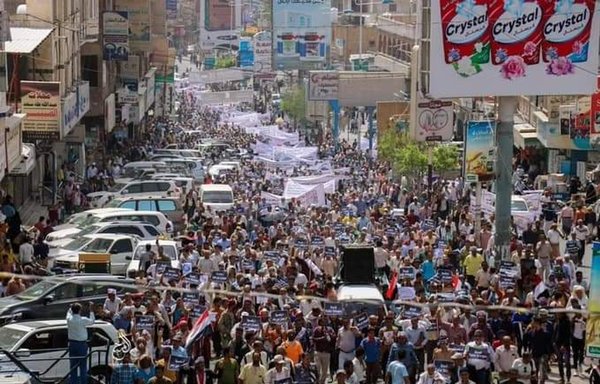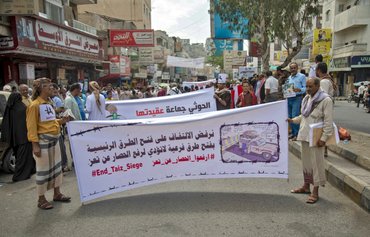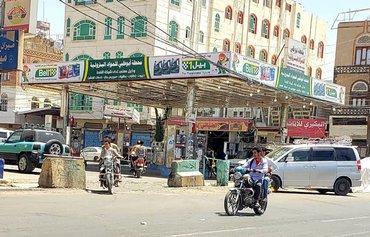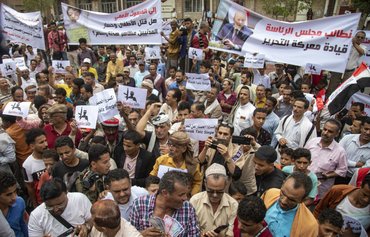ADEN -- The prolonged closure of roads linking the Yemeni city of Taez, which is under Houthi blockade, with the rest of the country has become a catalyst for near-daily demonstrations against the group.
Holding talks on Taez was one of the terms of the truce between the warring sides -- the Iran-backed Houthis and the legitimate government. The truce has been in place since April 2 and was extended for an additional two months on June 2.
Yet the roads remain blocked.
Earlier this month, the Houthis rejected a proposal to reopen the roads to Taez put forward by United Nations (UN) envoy Hans Grundberg.
![Hundreds of protesters gather in Aqabat Mounif after the Friday prayers on June 3 to demand an end to the blockade imposed by the Houthis on Taez. [Ahrar Taiz Network/Facebook]](/cnmi_am/images/2022/06/29/35918-taez-end-siege-600_384.jpg)
Hundreds of protesters gather in Aqabat Mounif after the Friday prayers on June 3 to demand an end to the blockade imposed by the Houthis on Taez. [Ahrar Taiz Network/Facebook]
Grundberg was slated to arrive Monday (June 27) in Riyadh to discuss the matter with Presidential Command Council chairman Rashad al-Alimi, Asharq al-Awsat reported.
The truce has ushered in some positive changes, and the recently concluded Yemen International Forum set the stage for some constructive dialogue on economic and security challenges and efforts to establish peace.
But Yemeni forces warn that the Houthis have been sending reinforcements to some areas, raising concerns over the possibility of renewed conflict.
In a May 24 letter to Yemeni government officials and Houthi delegations, Yemen TV anchor Saddam Hassan described the extent of suffering caused by road closures between provinces.
Hassan called for an end to the seven-year war, which he said has caused "misery, deprivation, regret and pain", especially for residents of besieged areas along highways in Taez, al-Hodeidah, Marib and al-Bayda provinces.
In his letter, Hassan described the "catastrophic psychological, economic, social and health consequences for the public", citing the suffering of patients, pregnant women, the elderly and the internally displaced population.
Only recently, Hassan said, has he been able to visit his own relatives in the al-Hodeidah province town of Hays, after more than seven years apart.
"During that time, I could not see my uncle and some other relatives, who have now passed away," he said.
Hassan said he was unable to share special moments and occasions with his relatives but stressed that "this is not just about me; rather, tens of thousands of Yemenis have faced the same situation".
Daily protests in Taez
"Distances that the people of Taez used to travel in just 10 minutes now take more than eight hours, and the cost is up to 10,000 YER ($40), compared to the previous 100 YER ($0.40)," said government employee Abdul Raqib al-Sharjabi.
"Going to central Taez from adjacent areas now requires travelling on mountainous, winding, dangerous roads," he told Al-Mashareq. "Those areas were once easy to reach."
He also pointed to the additional security risks travellers now face, noting that hundreds have been arrested at checkpoints manned by the Houthis.
Taez has been the scene of near-daily demonstrations, as residents gather to protest the continued closures of roads, despite the extension of the truce agreement.
Protesters also decry living conditions in the city, and call for the release of detainees.
Hundreds of protesters assembled at al-Horreya [Freedom] square in Taez on June 17, raising banners that called on the Houthis to end the siege.
A large crowd also assembled at Aqabat Mounif in the Jawlat al-Qasr area of Taez to urge the international community and humanitarian organisations to help bring the siege to an end and relieve the afflicted.
Collective punishment
Sanaa clothing salesman Faed Abdul Bari said he does not want to visit his family in Sharab district because of the risks that travellers may face.
He said he longed to see his parents, whom he has not seen in seven years, and expressed his hope that the roads would be re-opened soon.
"I fear something ill may befall them, God forbid, before I could see them," he said.
According to economist Abdul Aziz Thabet, Taez is Yemen's largest population centre, with more than four million people living there.
"Therefore, besieging them for seven years and tightening the noose on them are some sort of collective punishment, in view of the shortage of supplies," he said.
"If supplies finally come, they're usually transported via rough terrain and at higher costs, exacerbating economic suffering," Thabet said.
Barriers and checkpoints at the entrances to Taez prevent the arrival of medicines, medical supplies, and foods for residents and for patients who cannot be transferred outside town, he said.
Meanwhile, "moving to another province is extremely difficult because of checkpoints, sniper attacks, mines and other explosives planted by the [Houthi] militias along roads and in homes", Thabet added.
Putting truce at risk
Deputy Minister of Justice Faisal al-Majeedi said Yemen's legitimate government has made concessions for implementing the humanitarian truce and alleviating the suffering of Yemenis.
"The ball, therefore, is now in the Houthis' court," he said. "But the Houthis' refusal to open roads threatens the entire truce with collapse."
"The government has no reservations," he added. "We want the truce for a just peace, not a truce for preparing for war."
Political analyst Abdul Hafiz al-Nahari said the Houthi delegation did not reopen roads because the decision is not in its hands.
The decision is in the hands of its sponsor, Iran, instead, he said.
Al-Nahari called on the UN Security Council to urge the Houthis to re-open the roads to Taez and in some other areas, and to implement the truce agreement as a prelude for reaching a peace deal and bringing an end to the war.








